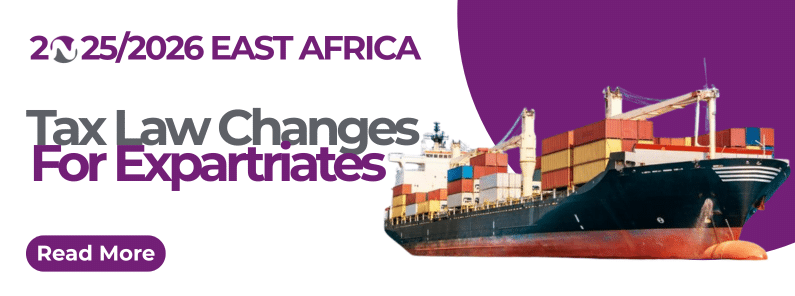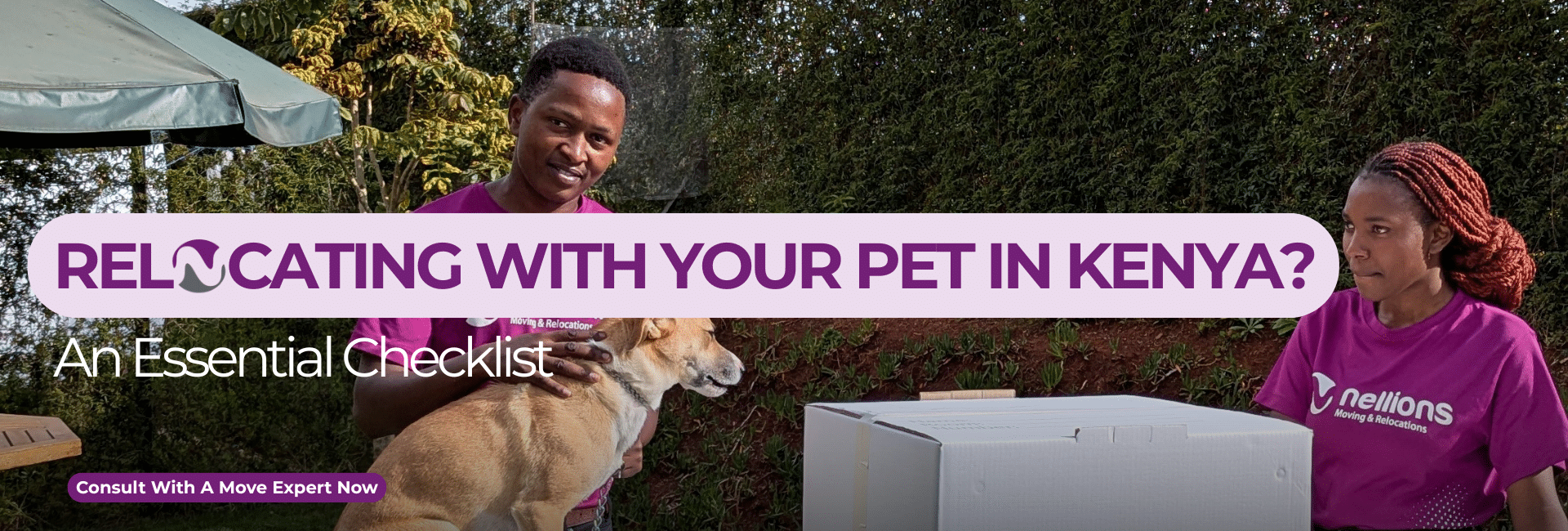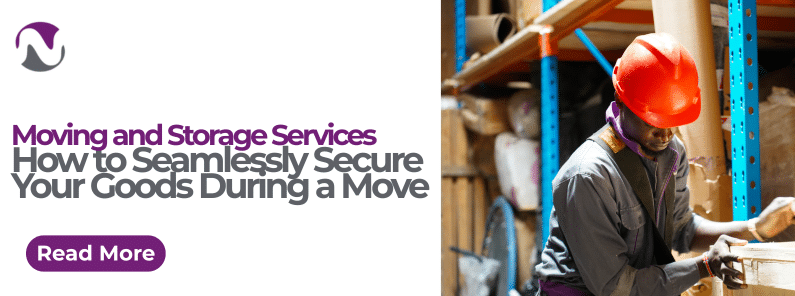Entering the 2025/26 financial year, East Africa’s customs environment is witnessing a significant evolution. Across Kenya, Tanzania, Uganda, and Rwanda, new budgets and updated East Africa 2025/26 Tax Law Changes are introducing major adjustments to how personal imports—especially household goods and vehicles—are managed, taxed, and documented at the border.
These changes directly affect expatriates relocating to Kenya, returning residents moving back home, and diplomatic staff beginning new postings in the region.
Whether you are organizing an international relocation to Kenya from Europe, returning after studies in the US, or transferring on official diplomatic assignment, understanding these rules is critical. Not only do the updates affect your relocation costs, but non-compliance could also result in delays, penalties, or seizure of shipments.
This East Africa 2025/26 Tax Law Changes update from Nellions Moving & Relocations, trusted experts in international relocation services in Kenya, breaks down the new reality of personal imports in East Africa, covering each country, compliance requirements, and strategic steps for expatriates and returning residents.
Summary Table: Fiscal Year Timelines (2025/26) for East Africa
| Country | Fiscal Year Start | Fiscal Year End | Latest Budget Speech | Most Recent Laws Take Effect |
|---|---|---|---|---|
| Kenya | 1 July 2025 | 30 June 2026 | 13 June 2025 | 1 July 2025 |
| Tanzania | 1 July 2025 | 30 June 2026 | 12 June 2025 | 1 July 2025 |
| Uganda | 1 July 2025 | 30 June 2026 | 13 June 2025 | 1 July 2025 |
| Rwanda | 1 July 2025 | 30 June 2026 | 12 June 2025 | 1 July 2025 |
Fiscal year synchronization across Kenya, Tanzania, Uganda, and Rwanda means all new tax and compliance rules take effect between July–October 2025.
Kenya: Import Regulations and Tax Changes for 2025/26
Household Goods and Personal Effects
For expatriates, returning residents, and diplomats moving household goods to Kenya, exemptions remain in place but with some tightening of oversight and documentation:
- Returning Residents: If you’ve lived abroad for at least two consecutive years, you are eligible for duty-free import of used household effects and one personal motor vehicle, if proven owned/used abroad for at least 12 months and imported within 90 days of your return. This exemption covers Import Duty, VAT, Excise Duty, and Import Declaration Fee (IDF), but not Railway Development Levy (RDL). You must not have benefitted from a similar exemption in the past 3 years. Additional documentation (work permits, evidence of residence, shipping documents) is mandatory, and all goods must arrive within the allowed window, with possible extension upon request as long as the import is within 360days from the date of your re-entry. Compliance is tight: failure to meet the timelines or ownership/use requirements results in full duties being charged.
- Expatriates on First Work Contract: Like in previous years, expatriate staff relocating to Kenya for a new contract of at least 2 years enjoy duty-free import of their used household effects and one vehicle (if owned/used for 12 months and imported in proper time). This is valid as long as the goods are for personal use and are not sold/disposed of during their stay on contract. You must provide a valid work permit, contract, passport, and comply with shipping timelines.
- Diplomatic Staff: Diplomats officially accredited in Kenya can bring household and personal goods, and one motor vehicle, free of duties/taxes within 90 days of their first arrival (extendable). Specific diplomatic paperwork and accreditation with the Ministry of Foreign Affairs is required for smooth entry; goods should not be resold within this period.
Compliance and Documentation: The Kenya Revenue Authority (KRA) has refined its systems for tracking duty exemptions and introduced strict documentation requirements. You must have: Original passport, residence/work permit, PIN certificate, bill of lading/air waybill, commercial invoice, comprehensive inventory, and an authority letter appointing a licensed customs agent. The most radical change is the new regulation that now requires that each consignment be accompanied by an official Certificate of Origin (COO) from October 2025, even for previously exempt imports—setting a new standard of compliance across all importers (including those not relying on preferential trade treaties). For non-compliance, shipments face seizure or forfeiture—though a 3-month compliance grace window is available until 30th September 2025.
A Certificate of Origin is a document that tells customs officials where a product was made. Think of it as a birth certificate for goods: it proves that an item – whether it’s bedsheets, paintings, clothes, books, toys, electronics, or furniture – was originally manufactured in a specific country. It’s typically issued by an independent, accredited authority to ensure impartial verification of where goods are produced. These authorities include:
- Chambers of commerce authorized under national law
- Customs administrations or designated government agencies
- Other industry bodies recognized by trade agreements for origin certification
If for example one is shipping a twenty feet container to Kenya with 500 different pieces, she will need a COO confirming the countries where each of the items was manufactured in. Many industry players believe that this requirement is almost impossible to enforce the East Africa 2025/26 Tax Law Changes – in the case of used household goods but until the law is changed, this remains the position
Table: Summary of Key Compliance Documents for Kenya
| Requirement | Needed For | Deadline | Notes |
| Original passport | All importers | On arrival | Show 2+ years residence abroad if returning resident |
| Residence/work permit/ Pro 1b | Expatriates, diplomats | Before shipment | Work contract ≥ 2 years; must be valid in Kenya |
| Bill of lading/air waybill | All shipments | On arrival | Must correspond to inventory, dates |
| Commercial invoice | All shipments | Before import clearance | Especially for new items or vehicles |
| Inventory/packing list | HHG/personal effects | Before customs declaration | Detail by box, value, signed by owner |
| Authority letter | All importers | Before customs clearance | Nominate a licensed customs clearing agent |
| PIN certificate | All importers | Obtain before clearance starts | Absence prevents any clearance process |
| Certificate of Origin (COO) | All imports (from Oct 2025) | From Oct 1st, 2025 | Crucial under Finance Act 2025, allows clear tracking |
The moving industry and clearing firms are fighting to have the COO requirements removed as it is impossible to comply for personal effects.
Vehicle Import Rules and Taxes in Kenya
- Age Limit: No vehicle older than 8 years from the date of first registration may be imported. The “registration year” is considered January–December, so even vehicles acquired late in a year may be classified as a year older at customs.
- Right-hand drive only (rare exemptions apply) : Only right-hand drive vehicles are permitted for general use, with rare exemptions strictly for returning residents from left-hand drive countries under replacement rules (a right-hand replacement not exceeding the value of the previously owned left-hand drive, and all documentation proving ownership/disposal abroad)
- Taxes/Duties:
- Import Duty: Standard 25% of the “customs value” (CIF or CRSP basis).
- Excise Duty: Ranges from 20-35% based on engine size, fuel type, and year of manufacture; luxury or large engine vehicles pay more.
- VAT: Standard 16% applies on the sum of customs/CRSP value plus duty plus excise.
- Import Declaration Fee (IDF): 2.5% of customs value.
- Railway Development Levy (RDL): 2% of customs value. –CRSP (Current Retail Selling Price) Update: The July 2025 CRSP schedule significantly affects calculated duty; even minor year/model changes alter duties by tens of thousands of shillings.12
- Inspection: All vehicles whether new or used – require a Certificate of Roadworthiness from approved agents (QISJ, or KEBS) in country of export. No compliance, no clearance; significant fines and possible re-export for non-adherence
For expatriates importing cars into Kenya, duties can total 35–45% of vehicle value.
Vehicle Import Tax Calculator Example (2025)
For a used 2017 Toyota Allion (8 years old), CRSP = Ksh 3,524,152; Duties are:
- Depreciated Customs Value: Ksh 1,233,453
- Import Duty (25%): ~Ksh 308,363
- Excise Duty (20%): ~Ksh 308,363
- VAT (16%): ~Ksh 261,347
- IDF (2.5%): ~Ksh 30,836
- RDL (2%): ~Ksh 24,669
- Total of all taxes, fees, and levies: Ksh 933,578+
Takeaway: Total car import taxes/fees can reach 35-45%+ of the assessed CRSP (less depreciation), per the July 2025 rules. Always use up-to-date calculators or clear with KRA.
New VAT and Excise Developments
- The Finance Bill 2025 established a new 16% VAT on many items and services previously exempt or zero-rated (including locally assembled vehicles, energy equipment for aid projects, selected medical equipment, certain manufacturing inputs, and selected construction materials). The shift is partly to reduce VAT exemption misuse, with Section 66A introducing penalties for using exempt or zero-rated goods outside their stated purposes. For importers, these measures mean costlier inputs and heightened compliance checks – a key consideration for those importing assets under “exempt” status for corporate, aid, or personal use.
- Excise Duty: Expanded to digital asset transactions, selected packaging, paper, glass, and aluminum profiles. Many of these are now taxed at specific rates for easier enforcement; failure to obtain an excise license means administrative penalties and shipment delays.
Household Goods
Tanzania’s household goods exemptions for new expatriate staff and returning residents continue under the EAC legal framework, but the TRA (Tanzania Revenue Authority) has tightened compliance:
- Duty-free household goods are permitted for those with valid work/accommodation contracts or residents returning after long-term stays abroad.
- Goods must be owned and used for at least one year, as proven by documentation.
- Your goods must arrive within three months of your first arrival
- You must appoint a licensed clearing and forwarding agent (CFA), lodge all paperwork online (TANCIS system), and submit required documents at least 7 days before vessel arrival.
Mandatory documents include: Original passport, work/residence permit, original bill of lading or airway bill, commercial invoice, packing list, agent’s authorization, exemption documents (if applicable), and all required import permits (TBS, TMDA, etc.).
In the new finance bill, Tanzania has introduced a 10% IDL (Industrial development levy) on all imports, this is on top of the Railway development levy at 2% of the CIF value.
Vehicle Import Rules and Costs
In 2025, Tanzania revised its vehicle import policy to:
- Age Limit: Only used passenger cars, SUVs, and pickups up to 10 years old allowed (was 12 years prior). Heavy vehicles also face stricter age limits. Older vehicles face extra taxes or are denied entry. Otherwise Old age excise duty of 30% applies
- Engine-Capacity Duty Structure:
- Up to 1.5L Petrol: ~25% import duty.
- 1.6–2.0L Petrol: ~30%
- 2.0L Diesel: Up to ~40%
- Hybrids and Euro-6 compliant vehicles get 5-10% “green rebate.”
- Other Vehicle Taxes:
- Excise (varies, see latest TRA tables)
- VAT: 18%
- Road fund levy
- Inspection/certification costs
All automobiles must pass a Pre-Shipment Verification of Conformity (PVoC) by authorized agencies – mandatory for customs clearance. Failure leads to penalties, delays, or outright rejection at port. Ports conduct physical spot checks to verify paperwork, and local post-clearance emissions/roadworthiness tests are mandatory before you can register for Tanzanian plates.19
Table: Vehicle Import Steps – Tanzania 2025
| Step | Description |
| Select and inspect vehicle | Preferably <10 years old; obtain all history and compliance docs |
| Pre-shipment inspection | Get certification from accredited export-country agent (e.g. JEVIC) |
| Ship with full documentation | Bill of lading, commercial invoice, original registration, export certificate, pre-shipment cert, packing list |
| Lodge documents via clearing agent | Submit to TANCIS at least 7 days pre-arrival |
| Arrival: physical inspection | Verify VIN, odometer, condition at port |
| Payments | Import Duty, VAT, Excise, Road fund, Port charges |
| Post-clearance tests | Local emission and roadworthiness before final registration |
| Registration/plating | Obtain Tanzanian registration, pay any annual taxes |
Total import costs can be substantial, often exceeding the value of the car when all taxes, levies, and compliance costs are tallied. Detailed quotations from reputable brokers are essential for budgeting.
Household and Vehicle Prohibitions/Restrictions
- No used tyres for light commercial/passenger vehicles; new or recertified only.
- No vehicles with left-hand drive (except permitted returning residents).
- Prohibitions extend to any item/substance on the CITES or dangerous goods list, illegal copies, and non-conforming products.
- Penalties for non-conformity (e.g., missing PVoC, paperwork errors) are substantial – including fines, forced re-export, or destruction at importer expense.18
Best Practice: Use a local broker/clearing agent familiar with TBS and TRA regulations. Provide all required paperwork – delays in documentation trigger delays, fines, or even loss of exemption rights.
Uganda: New Taxes, Levies, and Procedural Updates from the East Africa 2025/26 Tax Law Changes
Household Goods and Vehicle Imports
The Uganda Revenue Authority (URA) has rolled out procedural and fiscal updates for 2025/26, reflected in both tax/law amendments and stricter operational timelines:
- Returning Residents: Like Kenya and Tanzania, if you have lived abroad for ≥2 years you may import personal/household effects and one motor vehicle duty-free (excluding VAT and various levies, which still apply). The car must be owned and used by you abroad for at least one year and be under 15 years old at import. Documentation (valid passport, evidence of continuous residence, shipping docs) is strictly checked. All goods must arrive within 3 months of return.
- Expatriates/First Arrivals: Officially contracted employees on work visas may import used household/personal effects and one vehicle duty-free, provided paperwork is in perfect order, and goods are imported soon after first arrival. Documentation includes work permit, official letters, commercial invoice, packing list, and more.
- A customs interview at the border or port of entry is mandatory for all importers, except for diplomatic shipments.
- You are only allowed to bring in one of each type of electronic item; a second unit will attract taxes and levies.
For vehicles 8 years or older, expect a 20% age surcharge, and total costs can tip over half the vehicle’s landed value.
- Pre-shipment Inspection: Cars must be less than 15 years old and must pass a JEVIC (Japanese used vehicles) or equivalent roadworthiness inspection by accredited agents. Both right and left-hand drive vehicles permitted (with restrictions).
- Import Procedure: Use a URA-licensed clearing agent; file all paperwork (bill of lading, proof of purchase, inspection certificate, passport, import/export docs), pay taxes, submit for roadworthiness inspection, complete registration.
- Insurance: From 1 February 2025, all imports must be insured by local Ugandan insurance firms – proof is now required for clearance.
Noteworthy Amendment: “Home Use” Clarification
The External Trade (Amendment) Act 2025 now sharply distinguishes goods imported for domestic use from goods in transit (e.g., moving to Rwanda, DRC) – with the new levies applying to all “home use” imports, not re-exports or transits. Policy intent is to boost revenue, support local industry, and clarify customs rules.
Client Impact: Importing personal effects or a motor vehicle now carries new levies of 2.5% and more detailed documentation than ever before. Factor these levies introduced in the East Africa 2025/26 Tax Law Changes into your moving budget and timeline.
Rwanda: 2025/26 Customs Trends & Incentives
Household Effects and Exemptions
Rwanda maintains a contemporary customs approach aligned with EAC frameworks, but is leading the region in simplifying certain procedures and incentivizing green imports:
- Returning Residents and Expatriates: Duty-free status is available for those with valid residence permits or diplomatic postings, covering used household goods (owned/used for 12+ months). The same 90-day import window applies; paperwork and tax compliance are enforced rigorously.
- Documentation: Requires bill of lading, commercial invoice, packing list, import declaration, certificate of origin, tax identification, and proof of residence/permit. A registered clearing agent is a must for smooth clearance.
- In the 2025/2026 financial year, Rwandan Customs introduced a new regulation requiring VAT to be paid on personal effects at 18%, except for diplomatic shipments and returning residents.
Vehicle Import Policy and New Excise Trends
2025/26 budget updates focus on eco-friendly transport and logistics modernization:
- Tax Breaks on EVs and Hybrids: Full customs duty exemption continues for fully electric vehicles. For hybrids, moderate concessions apply, though VAT and excise are typically still charged. For 2025, EVs valued up to $60,000 enjoy zero duty; those above $60,000 fully exempt. Regular ICE vehicles (gasoline, diesel) now face the highest duties and taxes.
- ICE Vehicle Charges: Standard rates apply, with customs, VAT (18%), and road levies – a new annual road levy since May 2025 (FRW 50,000–150,000 on most private vehicles) and a separate 15% maintenance levy on petrol/diesel.
Table: Rwanda 2025 Car Import Tax Approach
| Vehicle Category | Customs Duty | VAT | Excise | Annual Levies | Registration/Compliance Notes |
| EV (≤$60,000) | 0% | 0% | 0% | FRW 50–150k | Incentives for charging infrastructure |
| Hybrids | 0–25% | 18% | Yes | FRW 50–150k | Lower duty, still faces VAT/excise |
| ICE (petrol/diesel) | Standard | 18% | 35–40% | FRW 50–150k | Highest total import cost |
Full documentation is crucial – Rwanda has streamlined quick release, but only for complete and accurate files.
What These Changes Mean for Clients Relocating to East Africa
Higher Budgetary Pressures
- Personal import costs are rising: Expect to pay more owing to revised VAT, introduction of new levies (Uganda/ Tanzania and Rwanda), stricter vehicle age rules (Tanzania, Kenya), and recalibrated customs valuation methods (CRSP, updated inspection benchmarks).
- Even goods previously exempt may now attract VAT, excise, or infrastructure levies if documentation or usage is not carefully controlled.
Documentation is No Longer Optional
- Cross-country harmonization means importers must meet the strictest compliance and documentation standards across the region.
- Certificate of Origin (Kenya), pre-shipment inspection (multiple states), and licensed agent requirements are now uniform minimums.
- Late or missing documents now almost always result in seizure, delays, or loss of duty exemption – especially with the shrinking grace windows.
Non-Compliance Risks
- New clawback rules: If you dispose of “exempt” goods (e.g., sell your duty-free car/household items before expiry of the exemption period), you can be charged retroactive VAT/duties and face penalties.
- All countries are training customs to actively audit previously self-declared imports and pursue tax recoveries more assertively, drawing on improved cross-border information-sharing.
Environmental and Industry Shifts
- Rwanda, and to an extent Kenya and Tanzania, are pushing for green imports – full EVs attract zero duty or partial duty at relatively high value ceilings.
- Age and emission restrictions in Tanzania (and keen enforcement in Kenya and Uganda) are pushing importers to bring in newer, cleaner vehicles. Don’t count on sneaking in an older or non-certified car – it won’t work.
Compliance Steps and Strategic Recommendations
- Engage a reputable clearing agent or broker from the outset – ensure they are conversant with all East African updates, not just your destination country.
- Prepare documentation well in advance – secure all necessary certificates, invoices, and work/residence permits before shipping.
- Clarify your exemption status (returning resident, diplomatic, or first-arrival expatriate contract) and be prepared for strict scrutiny of eligibility and shipping timeline.
- Budget for extra costs – including VAT, new levies, and potential new customs valuation bases.
- Avoid misuse of exemptions – do not sell or transfer exempt goods/vehicles before minimum holding periods.
- Stay current – subscribe to official customs and fiscal updates and maintain direct communication with your broker/clearing agent for real-time guidance.
Conclusion
The landscape for personal imports into East Africa is evolving quickly, driven by governments’ need for revenue, economic integration efforts, and growing digital oversight of cross-border trade. These policy and legal shifts in the East Africa 2025/26 Tax Law Changes are making personal and vehicle imports more expensive, more documentation-heavy, and more risk-averse for non-compliance as the 2025/26 budget cycle begins in Kenya, Tanzania, Uganda, and Rwanda.
For expatriates, returning residents, and diplomatic personnel, the message is clear: thorough advance planning, diligent documentation, and reliance on professional customs agents or brokers are more vital than ever. Rely on accurate, up-to-date information – not old checklists or outdated online guides. Choose a relocation partner, like Nellions Moving And Relocations, who understands the full regional context and can coordinate with local, licensed clearing agents for every leg of your move.
Remember: The rewards for careful compliance of the East Africa 2025/26 Tax Law Changes are substantial duty/tax savings, quicker customs clearance, and the ability to focus on your new East African chapter – with peace of mind that your household and vehicle have arrived legally, safely, and at the best possible cost.
👉 Planning an international move to Kenya? Trust Nellions Moving & Relocations—your partner for seamless, compliant, and stress-free relocation.












